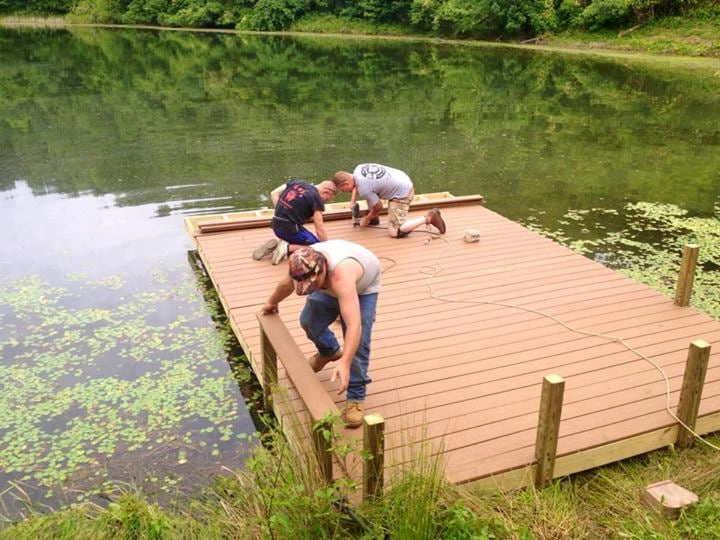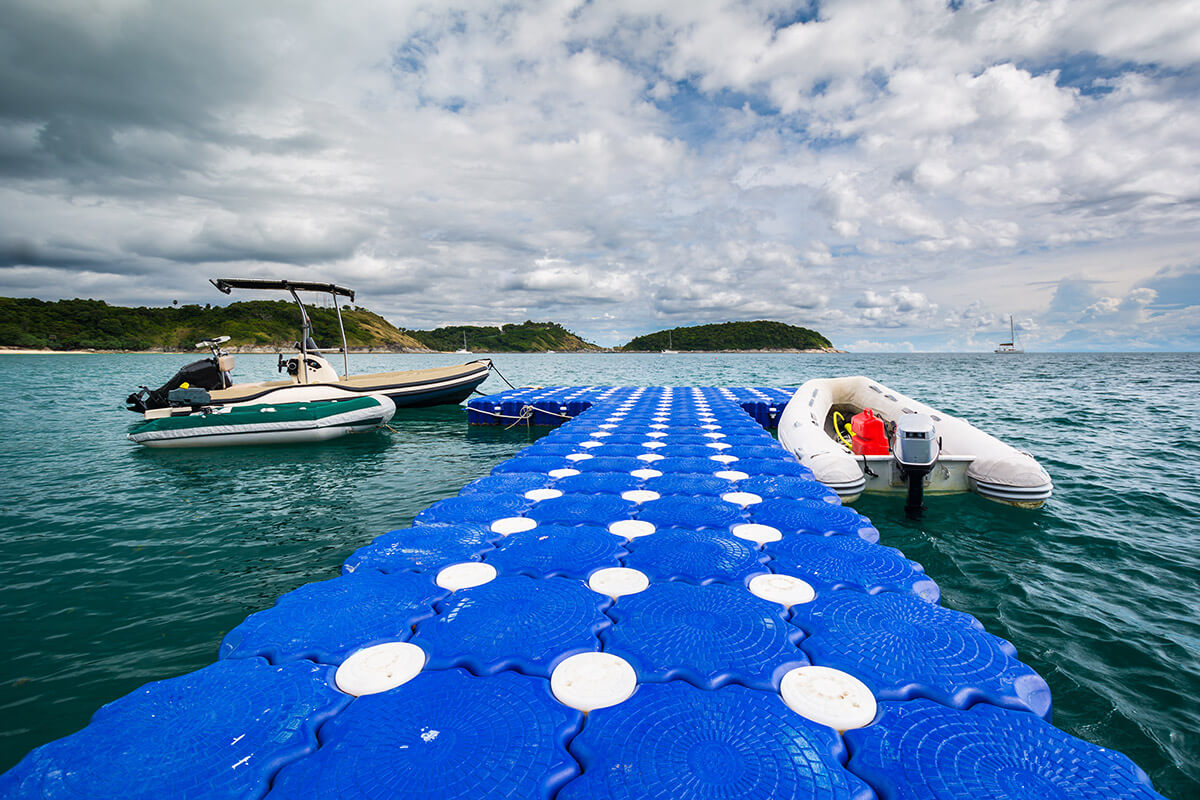Explore the Series Of Floating Dock Solutions Designed to Suit Every Boater's Requirements
Explore the Series Of Floating Dock Solutions Designed to Suit Every Boater's Requirements
Blog Article
Floating Docks: The Perfect Choice for Versatile Water Access
Floating docks present an engaging option for a range of water access needs, offering versatility that transcends traditional mooring alternatives. The modular nature of floating docks assists in personalization, catering to certain requirements.
Benefits of Floating Docks
Floating docks offer various benefits that enhance water gain access to for numerous applications. Their capability to rise and fall with changing water levels makes them specifically beneficial in atmospheres with varying trends or seasonal variations. This adaptability guarantees that vessels can conveniently anchor without worry for the water's depth, supplying a trustworthy system for entertainment, industrial, and industrial usages.
Additionally, floating docks are frequently built from long lasting materials that stand up to corrosion, making them ideal for long-lasting use in aquatic atmospheres. Their installment is normally much less invasive than typical fixed docks, decreasing the environmental effect and facilitating quicker deployment (floating dock builder). This versatility permits simpler relocation or reconfiguration according to individual demands or ecological modifications
Safety is one more vital advantage; floating docks can supply steady accessibility for people boarding or disembarking from boats and decrease the threat of accidents related to unsteady surfaces. Additionally, they can be designed to suit a variety of devices, such as fenders and cleats, enhancing functionality. In general, floating docks stand for an efficient remedy for enhancing water access throughout varied sectors while promoting security and environmental sustainability.

Kinds of Floating Docks
Numerous sorts of floating docks cater to different demands and atmospheres, each designed with particular attributes to enhance capability. The most common kinds consist of modular docks, which consist of interlacing areas that permit easy personalization and development. These docks are perfect for entertainment usage, as they can be customized to fit numerous boat sizes and water conditions.
Another popular choice is the stationary floating dock, which stays secured in position yet drifts with transforming water degrees. floating dock company. This type is specifically matched for areas with very little tidal fluctuations, giving secure accessibility for fishing or swimming. Additionally, there are drive-on docks, which include a sloped design that allows boats to quickly drive on and off, making them appropriate for individual watercraft and smaller vessels
For commercial applications, durable floating docks are readily available, constructed from enhanced materials to hold up against substantial lots and extreme marine environments. Last but not least, green floating docks make use of sustainable materials and designs to minimize ecological impact, commonly including features like vegetation to support neighborhood wildlife. Understanding the different kinds of floating docks makes certain that users can pick the most ideal remedy for their details needs.
Installation Process Overview
A successful installment of floating docks calls for careful planning and focus to detail to make sure optimum performance and security. The initial step involves assessing the site conditions, including water depth, present, and potential challenges. This analysis notifies the choice of the ideal dock materials and design customized to the details setting.
Next, getting required authorizations is crucial, as lots of territories have regulations concerning construction on water bodies. As soon as consents are protected, the setup can continue. Begin by preparing the foundation, which may include anchoring systems or pilings customized to the dock type and local conditions.
Adhering to the structure arrangement, put together the dock areas according to producer try these out specifications. Make certain that all elements are securely secured and lined up to stand basics up to environmental anxieties. Placement the dock in the designated location, guaranteeing it is level and stable.

Maintenance Tips and Ideal Practices
After the installment procedure is full, continuous maintenance plays an important role in making certain the durability and performance of floating docks. Normal evaluations ought to be conducted to determine any signs of wear, degeneration, or damages - floating docks. Look for any loose fittings, cracks, or separation in the dock sections, as these can jeopardize structural integrity
Cleaning up the dock is vital to remove particles, algae, and various other build-up that can influence its look and safety and security. Use a mild stress clean periodically to keep cleanliness without causing damage to the surface area. In addition, using a safety sealant every few years can assist improve longevity and stand up to environmental wear.
Take note of the mooring lines and supports, guaranteeing they are totally free and secure from deterioration. Replace any kind of degraded components quickly to stay clear of risks. Seasonal changes might likewise be needed; throughout severe climate condition, rearranging or enhancing the dock can stop damages.
Applications for Floating Docks
Floating docks offer a wide variety of applications, catering to both entertainment and industrial requirements. In entertainment setups, they supply smooth accessibility to waterways for tasks such as boating, fishing, and swimming. Their flexible nature enables for installment in varying water degrees, guaranteeing secure and safe accessibility regardless of tidal fluctuations.
Readily, floating docks are essential for marinas and waterfront companies. They facilitate the docking of vessels, enabling effective unloading and loading of products. Their modular style permits for simple development or reconfiguration our website to accommodate transforming service needs, making them optimal for watercraft leasings, trip operations, or angling charters.
In addition, floating docks are utilized in environmental applications such as aquatic research and environment repair. They can act as platforms for scientific studies, monitoring water high quality, or carrying out wildlife surveys without troubling delicate communities.
In industrial contexts, floating docks are employed in construction jobs, offering access to hard-to-reach areas for equipment and personnel. Their convenience, longevity, and very little influence on the atmosphere make them an optimal selection for a large range of applications, improving both performance and access in numerous water-based settings.
Verdict
In conclusion, floating docks represent an ideal remedy for varied water accessibility needs, owing to their adaptability, sturdiness, and modular layout. Floating docks serve as a useful asset for leisure, business, and ecological jobs, making certain dependable accessibility to rivers and promoting sustainable methods in water atmospheres.
Floating docks existing an engaging option for a range of water gain access to needs, providing flexibility that goes beyond typical mooring choices.Floating docks deal numerous benefits that enhance water gain access to for various applications. In general, floating docks stand for a reliable solution for enhancing water access across diverse markets while advertising safety and ecological sustainability.
One more popular choice is the fixed floating dock, which stays anchored in place but drifts with changing water levels.In conclusion, floating docks represent an optimum solution for diverse water gain access to needs, owing to their adaptability, toughness, and modular layout.
Report this page